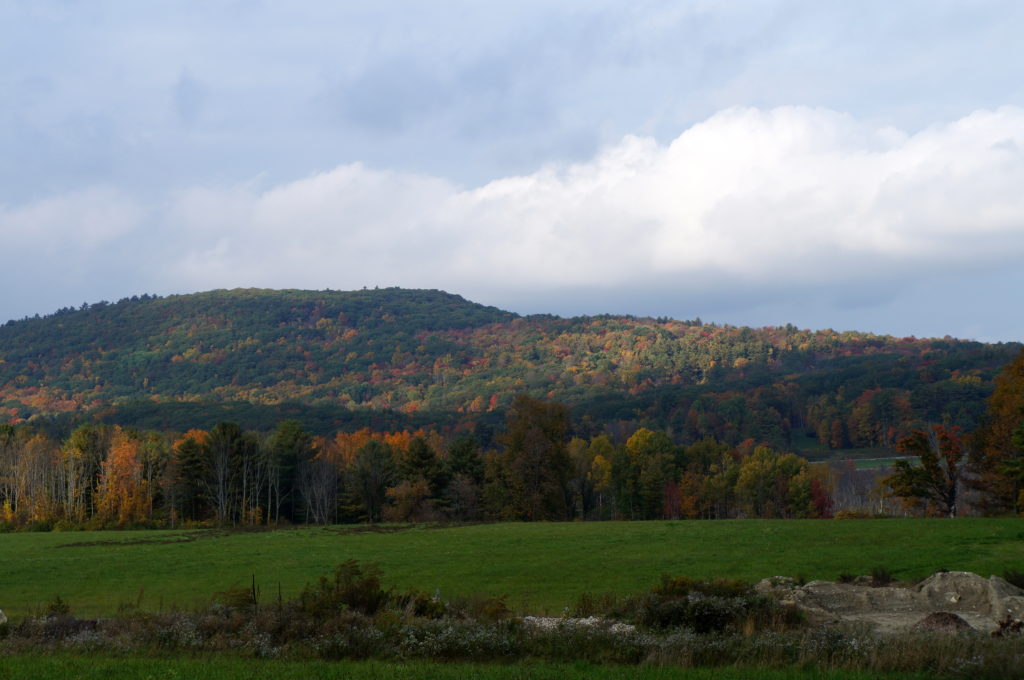I’m sitting in our hobbit-ranch home on the edge of a small Oregon town which is bordered by farms, and beyond that the Chehalem mountains which are aglow this time of year with autumn hues and evergreens. Up to this moment today, the sky has been a clear, glorious blue, which makes the large maple outside our window look like a sacred flame. Rather suddenly the weather has turned. There are bursts of wind, from which there is no shield, coming off of the flat farmland; the sky is a bright gray, like one large flat rain cloud. I’ve opened the window just a little, even though the air is bitingly cold, because I love the sound of the wind in the trees. It’s one of those moments that touches all human senses and places me in the realm of the beyond, remembering God as Creator, and myself at the mercy of His touch.
In just a half-hour of wind, the giant red maple is a third barer than it was earlier today. I feel a kinship with that tree, as it gets tossed about in this unforgiving weather. It reminds me of a conversation I had years ago. I had a smoking buddy in college. After studying all afternoon and into the evening, we’d meet up and walk around the small college town talking about everything and nothing, smoking our cigarettes. We both had ghosts in our pasts, and we never talked about any of that—we kept conversation pretty light and nonsensical, and yet a lot was said in all that was unsaid. A couple times I tried to bring up something real—like faith or love—and I knew right away by his body language that he didn’t want to go there. So I quietly agreed to this arrangement, like smoking without inhaling.
It was the end of fall and the ground was littered with fall muck—the muddy mixture of rotting leaves and pine needles and standing rain water. The trees were mostly bare. I looked down at my shoes a lot during those walks, and I remember seeing the wet leaves matted to my boots. He asked me, “If you could be a tree, what would you be—coniferous or deciduous?” He half-smirked, as though he knew it was a silly question. It was the kind of question one might be asked the first day of an orientation, a dumb get-to-know-you question; it’s ridiculous, but still reveals something about the person’s character.
“Deciduous,” I replied, without pausing. I’d thought of it before. I’d rather be beautiful and glorious for a short season, than the same for all time. At 20, that’s all I’d been doing my whole life, changing and moving and growing. I was intimidated by constancy. Having a career sounded daunting, marriage sounded terrifying, living in the same town for the rest of my life sounded like a prison sentence. I was thrilled and delighted by changeable things, and everything that celebrated it—fashion, art, film, etc—in the way a moth is to a flame, stupidly and thoughtlessly drawn. Of course, that kind of changeableness is exhausting and ultimately unfulfilling.
It strikes me as ironic, as I sit here, looking out at the calm after the short-lived storm, that though my life has been quite different than what I imagined at 20, I have in fact lived a deciduous life. It’s been ever-changing and shifting, but not from my own choosing. Everything about me—shape, color, fruitfulness, bareness—has shifted and moved from season to season. I feel more like a weathered tree, like the maple outside with the tips of its branches exposed. I’m only 37, but I am a bit worn and weary. I often think of Bilbo Baggins describing his weariness as “butter scraped over too much bread”. Exactly. At 20, when I imagined my “deciduous” life, I imagined it changing with adventure, travel, relationships, artistic endeavors; in short, a selfish existence where I called the shots, marked the seasons, changed when I willed. Of course, that never would have come to pass, even if I hadn’t had a conversion, hadn’t met someone that anchored me and helped me be a better human, hadn’t promptly started having babies and pouring myself out. Even if all that hadn’t happened, I would have eventually grown disillusioned, or frustrated with the many changes out of my control, even in a supposed self-driven life.

When I was 20, I didn’t really think about the tree’s seasonable bareness, just its ravishing beauty. But of course now, I see the cycle in its wholeness. I know this period I’m in of child-rearing and successive tasks is just a season. Another season is coming, with its own beauty and hardships. Even though I am weary and feel a bit physically ransacked, I have no regrets—this is the best way I can think of to spend my life. If we as humans are intended to spend ourselves, it’s best to embrace the deciduous nature of human existence; to embrace the seasons with trust in the Creator.
I am with you, for I have called you by name; your labor is not in vain.
